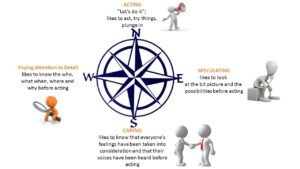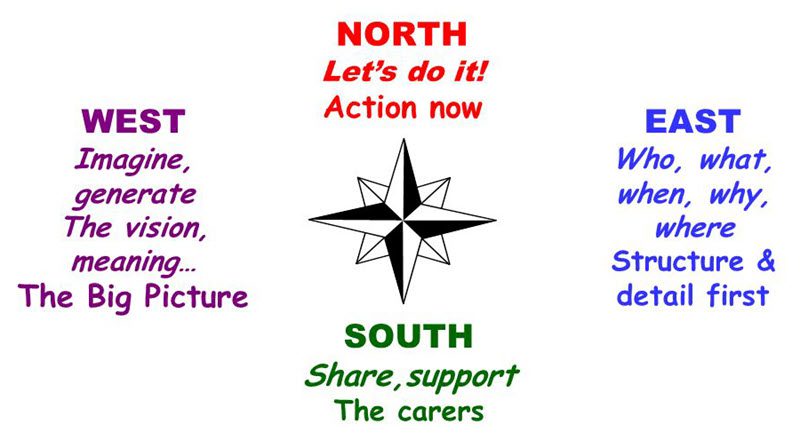
What is the Personality Compass?
In 1998, Diane Turner and Thelma Greco developed The Personality Compass, “A New Way to Understand People.”
Although similar to the four core Personality Temperaments, the Personality Compass focuses more on how individuals interact with others and less on personality tendencies like introversion vs. extraversion.
Personality Temperaments, Traits, and Types
Personality Temperaments, Personality Traits, and Personality Types are used in Psychology to discuss a person’s Personality, a collection of Emotions, Perceptions, and Actions that interact with each other, regulate themselves, and shape a dynamic system that forms a person’s Behavioral Patterns.
Your inherited traits (your personality Temperance) and acquired traits (such as education, socialization, and other various pressures and aspects) form your Personality.
A Personality Type identifies a specific collection of Traits, both learned and natural, that comprise a broad, general Personality Classification—a way of labeling a collection of traits and behaviors.
A Personality Trait remains consistent and stable over time, which means you exhibit the same pattern across different situations and throughout your life.
Three criteria characterize Personality Traits: (1) consistency, (2) stability, and (3) individual differences. For example, if you are talkative at home, you also tend to be talkative at work. And if you were talkative at age 20, you would still be chatty at age 40.
Personality Temperament is your “Naturally Intuitive” biological Trait. These Traits are partly inherited from your genes and partially determined by your brainstem, which doesn’t change throughout your life. These are Natural Traits regarded as innate or inborn and not learned.
Your Personality Temperament is formed as an infant and is hard to modify, manipulate, or change because it is genetic. In some way or another, your inherited behavioral tendency will always be there.
Personality Traits are quantitative differences between people, and Personality Types are qualitative differences between people. The most crucial difference between the Trait Theory and the Type Theory is that the Type Theory views people’s characteristics as discrete categories. In contrast, the Trait Theory views these characteristics as a continuum.
For example, while a Type Theorist would claim that introverts and extraverts are two types of people, a Trait Theorist claims extraversion is a gradient and individuals can fall somewhere in the middle.
Your Temperaments, along with acquired Traits, form your Personality.
The North Personality Type

You take charge. • You run the daily operation. • You have lists of things to do, and you need to get started and get them done. • You don’t have to ask questions to begin your work or assignment. • You teach our children a complete curriculum. • You will stitch the mosaic together and do the work.
Best Characteristics
Direct, assertive, independent, decisive, confident, open, ambitious, competitive, determined, and hard-working.
Worst Characteristics
Pushy, aggressive, controlling, sarcastic, impatient, arrogant, argumentative, always right/best, rude, and judgmental.
The North Personality Type calls a “Spade” a Spade.
Great Jobs for North Personality Types
Chief executive, military officer, director, head-hunter, security guard, police, conductor, pilot.
North Personality Type Cross-reference
MBTI Personality Types (xNTx) – Intuition and Thinking
Enneagram Types
- Type 1 – The Reformer (ENTJ, INTJ)
- Type 3 – The Achiever (ENTP)
- Type 5 – The Investigator (INTJ, INTP)
- Type 7 – The Enthusiast (ENTP)
- Type 8 – The Challenger (ENTJ)
Temperaments
- Keirsey Type – Rationals
- Temperament Type – Choleric
- Animal Type – Lion
- DISC Type – Dominant
- Socio-Communicative Type – Driver
- True Colors – Green
- Color Code – Red
- Personality Compass – North
- Occupational Type – Enterprising
- Learning Type – Activist
- Leadership Type – Dominator
Learn more about the North Compass Personality Type.
The East Personality Type
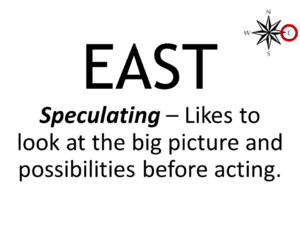
You have the big picture. • You need to see the final product and will work with the end in mind. • You believe in working backward, understanding by design. • You don’t get a project started until you are clear about the final product. • You teach our children the big concepts. • You know what the mosaic looks like in the end.
Best Characteristics
Fast, adventurous, visionary, innovative, creative, multi-talented, sense of humor, and free-spirited.
Worst characteristics
Silly, impulsive, undisciplined, careless, often late, inaccurate, and superficial.
The East Personality Type will call a “Spade” by its precise scientific name.
Great jobs for East Personality Types
Writer, architect, artist, builder, advertiser, estate agent, explorer, tour guide.
East Personality Type Cross-reference
MBTI Personality Types (xSxJ) – Sensing and Judging
Enneagram Types
- Type 1 – The Reformer (All Judging)
- Type 2 – The Helper (ESFJ, ISFJ)
- Type 6 – The Loyalist (All Sensing)
- Type 8 – The Challenger (ESTJ)
Temperaments
- Keirsey Type – Guardian
- Temperament Type – Melancholy
- Animal Type – Beaver
- DISC Type – Compliant
- Socio-Communicative Type – Analytical
- True Colors – Gold
- Color Code – White
- Personality Compass – East
- Occupational Type – Realistic
- Learning Type – Pragmatist
- Leadership Type – Avoider
Learn more about the East Compass Personality Type.
The West Personality Type
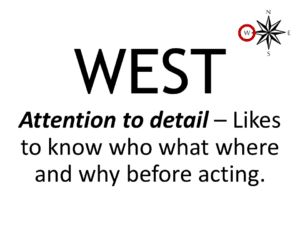
You ask the hard questions. • You live by inquiry. • You challenge us to identify the details. • You don’t start a project until you know the details. • You make our picture more complete. • You engage in thoughtful discourse. • You make us think and teach complex concepts to our children. • You fill in the details of the mosaic.
Best Characteristics
You are focused, organized, logical, proper, punctual, diligent, responsible, traditional, serious, and reserved.
Worst Characteristics
Loner, perfectionist, humorless, inflexible, obsessive, tunnel-visioned, critical, nagging, and unforgiving.
The West Personality Types doesn’t want to limit a “Spade” by assigning a name.
Great Jobs for West Personality Types
Judge, lawyer, surgeon, engineer, accountant, researcher, statistician, secretary.
West Personality Type Cross-reference
MBTI Personality Types (xNFx) – Intuition and Feeling
Enneagram Types
- Type 1 – The Reformer (ENFJ, INFJ)
- Type 4 – The Individualist (INFJ, INFP)
- Type 7 – The Enthusiast (ENFP)
- Type 9 – The Peacemaker (INFP)
Temperaments
- Keirsey Type – Idealists
- Temperament Type – Phlegmatic
- Animal Type – Otter
- DISC Type – Influential
- Socio-Communicative Type – Expressive
- True Colors – Blue
- Color Code – Blue
- Personality Compass – West
- Occupational Type – Artistic
- Learning Type – Theorist
- Leadership Type – Collaborator
Learn more about the West Compass Personality Type.
The South Personality Type

You slow us down and ensure everyone has a voice and is heard. • You bring up our affective domain. • You make sure the emotional side of our work is heard. • You teach our children with solid relationships and care. • You add beauty to the mosaic, ensure everyone participates in the creation, and keep us all comfortable.
Best Characteristics
Souths are friendly, laid-back, good listener, kind, hospitable, caring, nurturing, understanding, patient, and generous.
Worst Characteristics
Shy, dependent, clinging, lazy, complainer, insecure, easily hurt, vulnerable, and easily intimidated.
The South Personality Type calls a “Spade,” whatever it wants to be called.
Great jobs for South Personality Types
Coach, diplomat, teacher, doctor, mediator, receptionist, missionary, waiter.
South Personality Type Cross-reference
MBTI Personality Types (xSxP) – Sensing and Perceiving
Enneagram Types
- Type 2 – The Helper (ESFP, ISFP)
- Type 6 – The Loyalist (All Sensing)
- Type 7 – The Enthusiast (ESTP, ESFP)
- Type 9 – The Peacemaker (ISFP)
Temperaments
- Keirsey Type – Artisans
- Temperament Type – Sanguine
- Animal Type – Golden Retriever
- DISC Type – Steadiness
- Socio-Communicative Type – Amiable
- True Colors – Orange
- Color Code – Yellow
- Personality Compass – South
- Occupational Type – Conventional
- Learning Type – Reflector
- Leadership Type – Accommodator
Learn more about the South Compass Personality Type.
Personality Compass Subtypes
Each cardinal direction on the compass represents a Personality Type. For the most part, everyone has a dominant Personality Compass Type. However, you will likely find you are a mix leaning in one direction or another.
There are eight sub-types:
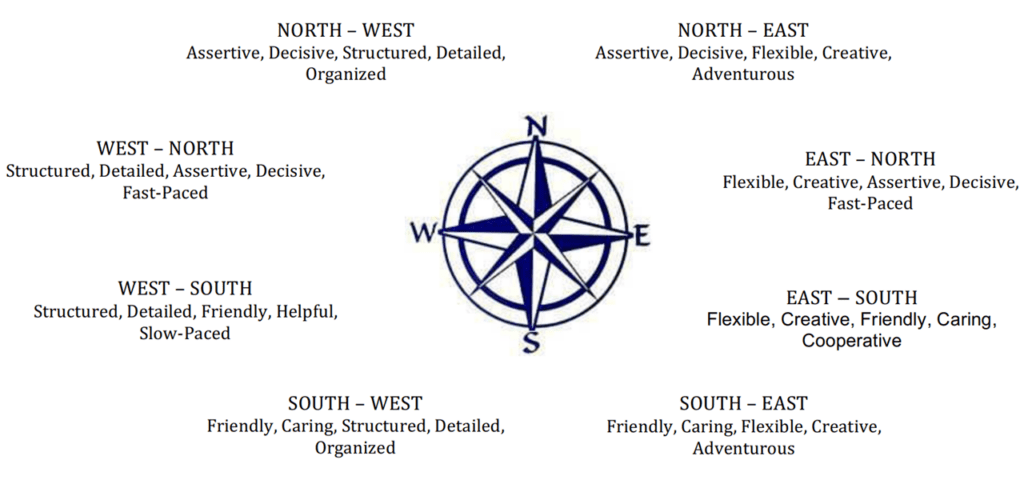
Interestingly, a person with a North-West Personality Type might have more in common with a West-North than a North-East, even though they have the same dominant type.
So, even two people, primarily North, can still be very different if they have opposite subdominant types, for instance, West versus East.

